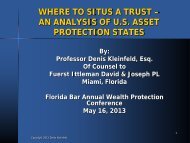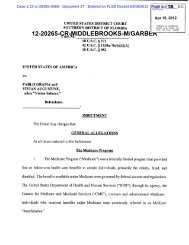here - Fuerst Ittleman David & Joseph, PL
here - Fuerst Ittleman David & Joseph, PL
here - Fuerst Ittleman David & Joseph, PL
You also want an ePaper? Increase the reach of your titles
YUMPU automatically turns print PDFs into web optimized ePapers that Google loves.
Case 3:10-mc-00024-GEB Case: 11-1612 Document: -DEA Document 003110561288 25 Filed Page: 01/07/11 59 Date Page Filed: 6 of 06/13/2011<br />
17 PageID: 470<br />
the United States and the Virgin Islands). It is undisputed that Mr. Gangi did not file a U.S. tax<br />
return for these tax years. Thus, one of the aforementioned exceptions to the IRC statute of<br />
1<br />
limitations (false return, willful evasion, failure to file) may apply, in which case the IRC statute<br />
of limitations would not preclude further tax assessments against Petitioners. Consequently, the<br />
Court rejects Petitioners’ objection to the extent that Petitioners maintain that the IRC statute of<br />
limitations demonstrates that the IRS lacks a legitimate investigatory purpose under Powell.<br />
2. Incomplete Legal Standard<br />
Petitioners next argue that Magistrate Judge Arpert application of the Powell standard<br />
was incomplete, because the R&R failed to account for Petitioners’ challenges on the<br />
“appropriate ground[s]. . . . that enforcement of the summons will result in an abuse of the<br />
court’s process.” (Petrs.’ Objections at 8.) Petitioners are correct that the Third Circuit in<br />
Rockwell recognized that a taxpayer could challenge an IRS summons on such grounds, see<br />
1<br />
In their original petition brief, Petitioners cited cases holding that failure-to-file<br />
exceptions to Code limitations provisions did not apply to cases w<strong>here</strong> the taxpayer submitted the<br />
incorrect tax form, but still gave the IRS all the data it needed to assess the tax. See, e.g.,<br />
Germantown Trust Co. v. Comm’r of Internal Revenue, 309 U.S. 304 (1940); Standard Office<br />
Bldg. Corp. v. United States, 819 F.2d 1371 (7th Cir. 1987). Yet, neither case addressed whether<br />
the failure to file tax returns with both the United States and the Virgin Islands, as required by<br />
IRC § 932(a), constituted a failure-to-file exception to the statute of limitations, as opposed to a<br />
wrong-form filing, which is not exempted from the limitations period. More importantly,<br />
though, these cases dealt with a tax assessment, not an IRS summons, which is issued during the<br />
investigative phase prior to a tax assessment. Even if the failure-to-file exception was<br />
categorically not applicable to Petitioners’ failure to file U.S. tax returns, the other two<br />
exceptions might still apply, if the IRS found that Petitioners filed a false return or willfully<br />
attempted to evade tax liability. As noted above, at this stage—a petition to quash an IRS<br />
subpoena—this Court need not consider the merits of Petitioners’ statute of limitations defense;<br />
this Court need only determine whether the IRS has a legitimate investigatory purpose. Under<br />
these circumstances, the Court cannot say that these cases or the IRC statute of limitations<br />
demonstrates that the IRS does not have a legitimate investigation purpose to issue these<br />
summonses.<br />
6<br />
A-000014










